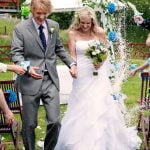Are you passionate about creating beautiful and memorable weddings? Do you have a knack for organization and attention to detail? If so, you may be considering a career as a wedding coordinator. In this article, we will explore the steps to becoming a successful wedding coordinator, from the qualifications and skills needed to gaining practical experience and starting your own business.
A wedding coordinator, also known as a wedding planner or bridal consultant, is responsible for overseeing all aspects of a couple’s wedding day. This includes coordinating with vendors, creating timelines, managing budgets, and ensuring that everything runs smoothly on the big day. Essentially, a wedding coordinator acts as a liaison between the couple and all parties involved in their special day to ensure that their vision comes to life seamlessly.
To become a successful wedding coordinator, it’s important to have the right qualifications and skills. In the next sections of this article, we will explore the education and experience needed, essential skills required for success in this role such as organization, communication, and attention to detail, as well as various training programs and certifications available for aspiring wedding coordinators.
So if you’re wondering how to become a wedding coordinator, read on to learn more about this exciting career path.
Qualifications
Becoming a successful wedding coordinator requires a combination of education and practical experience. While there is no specific degree required to enter this field, having a background in event management, hospitality, or business can be beneficial. Many aspiring wedding coordinators choose to pursue a bachelor’s degree in one of these fields to gain a solid foundation for their career. Additionally, taking courses or obtaining certifications related to wedding planning and coordination can provide valuable knowledge and skills.
Experience
In addition to education, gaining practical experience is crucial for anyone looking to become a wedding coordinator. Many professionals in this field start by working in entry-level positions at event planning companies, hotels, or catering businesses.
This hands-on experience allows individuals to learn about the intricacies of executing successful weddings and events. Aspiring wedding coordinators can also benefit from volunteering at local weddings or interning with established coordinators to get a feel for the day-to-day responsibilities of the job.
Certifications
While not mandatory, obtaining certifications in wedding planning and coordination can demonstrate your commitment and expertise in the field. There are various organizations that offer certification programs specifically tailored to individuals interested in pursuing a career as a wedding coordinator. These programs cover topics such as vendor management, budgeting, contract negotiation, and client relations. Earning a certification can set you apart from others in the industry and provide potential clients with an added level of confidence in your abilities.
By combining relevant education, practical experience, and possibly professional certifications, individuals can position themselves for success as they pursue their goal of becoming a wedding coordinator. Gathering these qualifications will help aspiring coordinators build their knowledge base and hone their skills needed to thrive in this competitive industry.
Skills
Organization
One of the essential skills required to become a successful wedding coordinator is organization. As a wedding coordinator, you will be responsible for managing multiple tasks simultaneously, such as coordinating vendors, creating timelines, and ensuring that everything runs smoothly on the big day. Being organized means being able to juggle these various responsibilities effectively, prioritize tasks, and stay on top of deadlines.
Communication
Effective communication is another crucial skill for anyone aspiring to become a wedding coordinator. You will need to communicate with couples, their families, vendors, and other industry professionals on a regular basis. Clear and concise communication is key in understanding the couple’s vision for their special day and relaying that information accurately to all parties involved. Additionally, strong interpersonal skills are necessary to build rapport with clients and vendors alike.
Attention to Detail
Attention to detail is another important skill for a wedding coordinator. The ability to notice small details that others might overlook can make all the difference in executing a flawless event. Whether it’s ensuring that the seating arrangement is accurate or confirming that each floral arrangement matches the couple’s preferences, meticulous attention to detail is crucial in creating an unforgettable experience for the bride and groom.
These essential skills are vital for anyone looking to pursue a career as a wedding coordinator.
Training
Many training programs and certifications are available for individuals interested in pursuing a career as a wedding coordinator. These programs provide aspiring professionals with the necessary knowledge and skills to succeed in the wedding industry. One popular option is obtaining a degree in event management, hospitality, or a related field. A formal education can provide a comprehensive understanding of the industry, including topics such as event planning, budgeting, and vendor management.
In addition to traditional degree programs, there are also specialized training courses and certifications specifically geared towards wedding coordination. These programs often cover specific aspects of wedding planning, such as ceremony design, timeline management, and client relations. For example, the Wedding Planning Institute offers a Certified Wedding Planner designation that demonstrates proficiency in various aspects of wedding coordination.
Furthermore, hands-on experience through internships or apprenticeships can be invaluable for individuals looking to become wedding coordinators. Many aspiring professionals choose to shadow experienced coordinators or work at event planning companies to gain practical knowledge of the industry. This allows them to apply what they have learned in real-world settings and build their skill set.
Overall, the path to becoming a successful wedding coordinator involves a combination of formal education, specialized training, and practical experience. By taking advantage of these opportunities, individuals can acquire the foundational knowledge and skills needed to thrive in this rewarding profession.
| Training Program/Certification | Description |
|---|---|
| Degree in Event Management or Hospitality | Provides comprehensive understanding of the industry |
| Certified Wedding Planner designation | Demonstrates proficiency in various aspects of wedding coordination |
| Internships/Apprenticeships | Provides practical knowledge of the industry through hands-on experience |
Gaining Experience
Gaining practical experience in the wedding industry is essential for anyone looking to become a successful wedding coordinator. While education and training provide a solid foundation, hands-on experience is invaluable in this field. Here are some tips on how to gain practical experience in the wedding industry:
1. Internships: One of the best ways to gain valuable experience as a wedding coordinator is by completing an internship with a reputable wedding planning company or event venue. Look for internships that offer hands-on training in various aspects of wedding coordination, such as vendor management, budgeting, and client communication. Internships not only provide practical experience but also allow you to make important industry contacts.
2. Volunteer Work: Another way to gain experience in the wedding industry is by volunteering for local events, charity galas, or even friends’ weddings. Offer to assist established wedding coordinators or event planners with tasks such as set-up, guest coordination, and vendor management. Volunteering not only allows you to learn from experienced professionals but also demonstrates your dedication and work ethic.
3. Event Assistance: Consider working as an assistant or coordinator for smaller events such as birthday parties, corporate gatherings, or non-profit fundraisers. While these events may not be weddings, the skills and experience gained from organizing and managing these occasions are transferable to the wedding industry.
By taking advantage of opportunities like internships, volunteer work, and event assistance, aspiring wedding coordinators can gain valuable practical experience in the wedding industry and enhance their skill set.
Overall, gaining practical experience through internships and volunteer work provides aspiring wedding coordinators with firsthand knowledge of the industry and builds a strong foundation for future success in this competitive field.
Building a Portfolio
- Include a Variety of Events: When building your portfolio, try to include a diverse range of weddings and events that you have coordinated. This will demonstrate your ability to adapt to different styles, themes, and cultural traditions. Whether it’s a rustic barn wedding or an elegant black-tie affair, showing versatility in your portfolio is key.
- Highlight Your Successes: In your portfolio, be sure to highlight successful weddings where you were able to handle challenges effectively and bring the couple’s vision to life. Including testimonials from satisfied clients can also add credibility and reassurance to potential clients.
- Visual Appeal: Your portfolio should be visually appealing and well-organized. Use high-quality images of the events you have coordinated to showcase the attention to detail and creativity that you bring to each wedding. Consider creating before-and-after visuals or collages that demonstrate the transformation of the event space under your coordination.
In addition to these tips, consider creating case studies for select events in your portfolio. These case studies can provide insight into your process, problem-solving skills, and overall approach as a wedding coordinator.
Remember, when it comes to building a successful career as a wedding coordinator, having an impressive portfolio is essential in showcasing your abilities and attracting potential clients who are seeking someone with both the skills and experience needed for their big day.
Networking
Networking is a crucial aspect of building a successful career as a wedding coordinator. It provides opportunities to connect with other industry professionals, potential clients, and vendors. By establishing strong relationships within the wedding community, you can gain valuable insights, referrals, and support that can help advance your career.
One way to start networking in the wedding industry is by attending industry events such as bridal shows, vendor showcases, and professional conferences. These events provide an excellent opportunity to meet and interact with other wedding professionals, including photographers, florists, caterers, and venue managers. Additionally, joining professional organizations like the Association of Bridal Consultants or the International Live Events Association can provide access to networking events and resources.
Another effective way to network in the wedding industry is through social media platforms such as LinkedIn and Instagram. Engaging with other professionals through these channels can help you build connections and stay updated on industry trends and developments. Additionally, leveraging your online presence by sharing your work and engaging with potential clients can also help expand your network within the wedding industry.
Lastly, don’t underestimate the power of personal connections. Utilize your existing contacts within the industry to make introductions and recommendations for potential collaborations. Building strong personal relationships with other professionals can lead to valuable partnerships and opportunities for growth in your career as a wedding coordinator.
| Industry Events | Social Media |
|---|---|
| Attend bridal shows | Engage on LinkedIn |
| Join professional organizations | Utilize Instagram for networking |
| Participate in vendor showcases |
Starting Your Business
In conclusion, becoming a wedding coordinator involves a combination of education, experience, skills, and networking. If you are passionate about helping couples create their dream weddings and are willing to put in the effort to succeed in this competitive industry, then the rewards can be significant.
Obtaining a formal education in event management or hospitality can provide a solid foundation for a career as a wedding coordinator. Additionally, gaining hands-on experience through internships, volunteer work, or entry-level positions in the wedding industry is essential for building your skills and portfolio.
Furthermore, networking with other industry professionals and considering certifications can help you stand out from the competition and gain credibility with potential clients. And if you aspire to start your own wedding coordination business, it’s crucial to have a solid understanding of the legal and financial aspects involved. By following these steps and continuously honing your craft, you can position yourself for success as a wedding coordinator.
Remember that becoming a successful wedding coordinator does not happen overnight; it requires dedication, hard work, and continuous learning. But by following these guidelines on how to become a wedding coordinator, you can turn your passion for weddings into a fulfilling career helping couples create unforgettable experiences on their special day.
Frequently Asked Questions
What Is the Difference Between a Wedding Coordinator and a Wedding Planner?
The main difference between a wedding coordinator and a wedding planner is their scope of work. A wedding planner handles the overall planning, design, and coordination of the entire event, while a coordinator focuses on the logistics and execution on the day of the wedding.
Is Wedding Planning a Good Career?
Wedding planning can be a rewarding career for those who have strong organizational skills, attention to detail, creativity, and good communication abilities. It offers the opportunity to work with couples to create their dream wedding and be part of a special milestone in their lives.
How Do I Break Into the Wedding Industry?
Breaking into the wedding industry typically requires gaining experience through internships or entry-level positions with established wedding planners or event companies. Building a portfolio, networking with industry professionals, and obtaining relevant certifications can also help you establish yourself in the field.

Welcome to my blog about home and family. This blog is a place where I will share my thoughts, ideas, and experiences related to these important topics. I am a stay-at-home mom with two young children. I hope you enjoy reading it! and may find some helpful tips and ideas that will make your home and family life even better!





